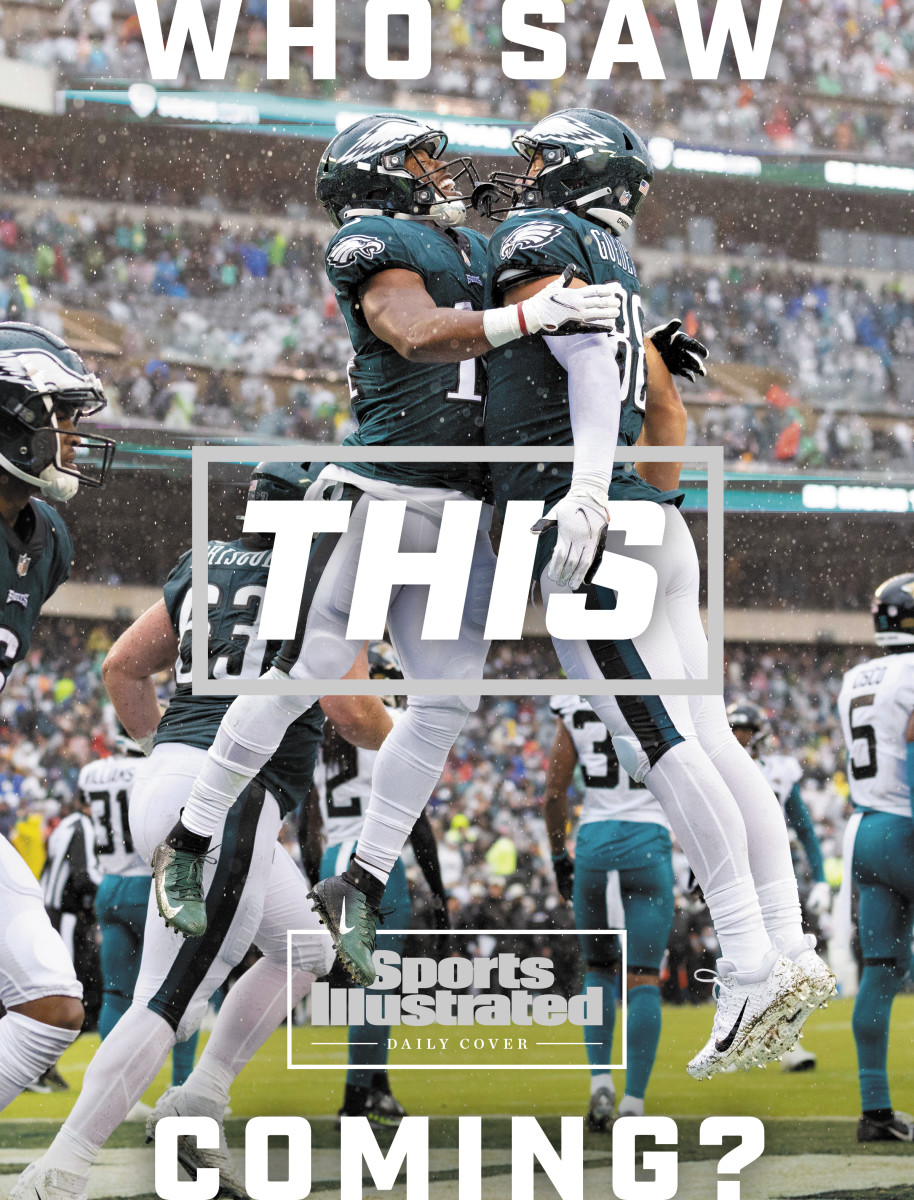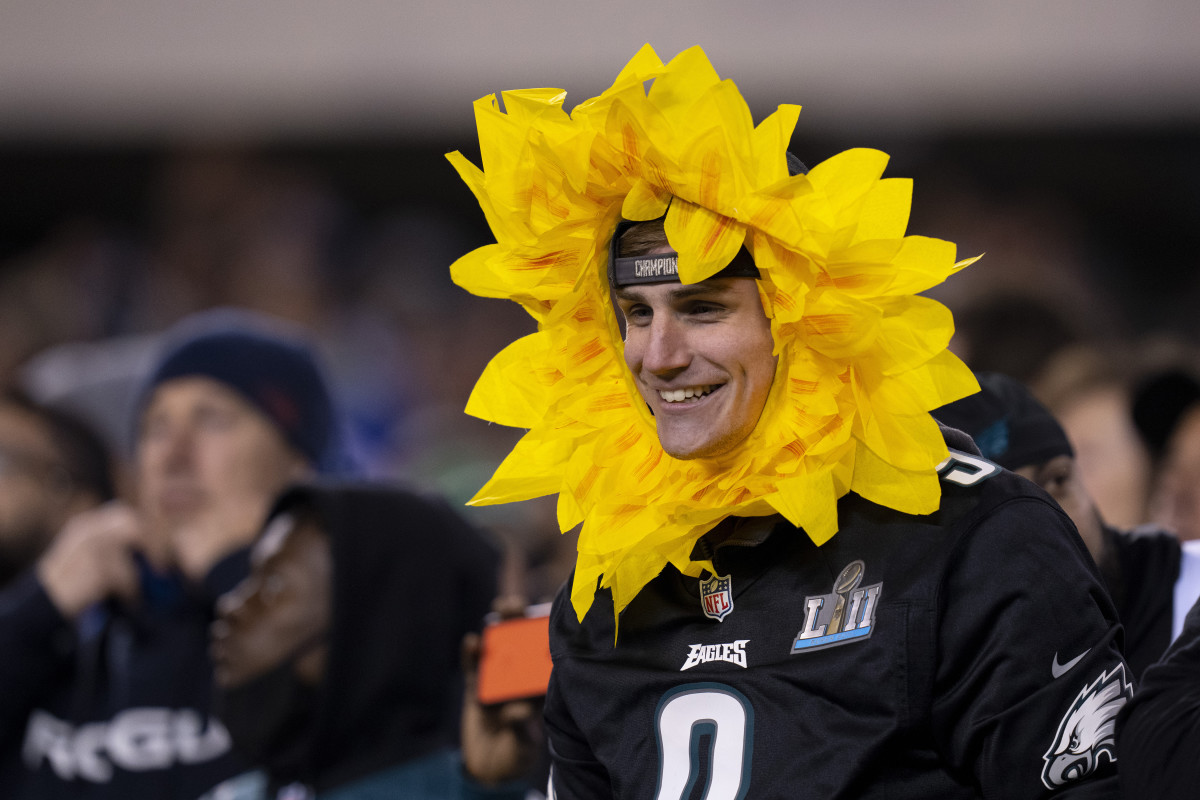What’s Become of the Eagles Team That Didn’t Stand a Chance

The Eagles are the lone undefeated team remaining in the NFL, moving to 4–0 with a rain-soaked victory over the Jaguars. They have one of the five best quarterbacks in the NFL, one of the most efficient offenses in football and one of its best defenses.
Since the midway point of the 2021 season, they have been boiling the best parts of their system on both sides of the ball to a powerful concentrate, then dressing that raw pulp a million different ways to convince their opponent that they are not about to knife it in the way it fears—and, ultimately, anticipate—it will get knifed. Like any talented chef, in their palms are the remnants of Friday’s seafood delivery. On the plates that they serve is Michelin Star ceviche. It’s something that happens only when a team understands itself in the most intimate ways.
This is difficult to do, though it is only part of the Eagles’ narrative. The other component of their emergence is broader in scope and, while nebulous, essential to their ability to both survive and flourish in their unique ecosystem. It’s even harder to do than scheme up consistently devastating football plays.
Philadelphia is a city that has treated even its winningest coaches with all the love and respect of a distant, Victorian-era parent—never mind coaches and star players and other prominent sports figures who have laid themselves bare in some misguided attempt to motivate or change its perception, only to get dressed down by one of the most calloused fan bases in professional sports. This is a group of people who, collectively, are a lot like how comedian John Mulaney describes eighth graders: “They’ll make fun of you, but in an accurate way. They’ll get right to the thing that you don’t like about yourself. They don’t even need to look at you for long.”

On Sunday, Eagles coach Nick Sirianni sat cooly at the podium, just like he has each of the past four weeks, with all the deserved confidence of a friend who has just received early admittance into college. On many occasions, he will wear T-shirts that either celebrate the area, or a certain player, or a nearby landmark or a local high school (a personal favorite: a retro-ish Allen Iverson 76ers jersey straight out of an early-2000s fever dream). This comfort and lack of defensiveness is the best way to outwardly represent the simpatico relationship he, and his team, have achieved with a city that seemed certain to swallow him whole, just like it did to Doug Pederson, he of the Super Bowl LII champions, and Chip Kelly, five games over .500 at the time of his firing.
A little more than a year before that, Jalen Hurts was viewed as a bridge quarterback at best, meant to neatly Band-Aid the gap between Carson Wentz’s ouster and whichever player they would select in the upcoming draft (Google “Eagles” and “Spencer Rattler” or “Matt Corral” for a view of a very entertaining, upside-down universe). Their offensive line was aging. Their secondary was nonexistent. Their pass rush was fading.
And Sirianni himself was the author of one of the most lampooned opening press conferences in recent NFL history, back when he received the job in late January 2021. It was the layer of film that clung to all other associated doubts about the Eagles, and perhaps why they’d moved on from the guy who had just won them a Super Bowl.

“It was a train wreck,” said Howard Eskin, the legendary Eagles sideline reporter and Philly media institution of more than three decades, on Sunday night when asked to look back. “It was a major league train wreck. It was awful. It was a joke.”
Sirianni read off a cue card. He appeared nervous. He jumbled unfortunate parts of his speech dealing specifically with his desire to build a smart football team. He was filleted online, with people comparing him to a less-composed Michael Scott unknowingly struggling through a meeting with David Wallace. Last fall, he started 2–5.
Joe Giglio, a host on Philadelphia’s powerhouse WIP talk radio station, says that a caller phoned in last year and called Sirianni “a high school coach trying to run a professional football team.” Later on that season, another caller compared him to an unfunny version of Ted Lasso, the American football coach who tries to find success overseas in soccer.
“People called him overmatched, said he had no clue, but the meanest thing people said was that they should get rid of him after five games. Hosts and callers,” Eskin says. “It was relentless.”
Then, in late October last year, Sirianni compared the Eagles to a flower. He told the media that, in a meeting, he showed players a picture of the plant’s root structure. It was symbolic of growth underneath the surface, the kind of progress we cannot see until, one day, something beautiful smashes its way out of the dirt. Fans responded by dressing up as flowers.

In the eyes of a cynic ready to pounce, these were the final flailings of a coach who had clearly chosen the wrong playground; the public negativity threatened to bull over a vulnerable locker room. Though, as close observers of Sirianni see it now, it was something entirely different. It was, on a personal level, a determination to stay the course. The introductory press conference was, perhaps, an attempt to be something other than himself. The Eagles went 7–3 following the “flower” speech, and both the coach and team clawed their way out of the ninth circle of optics hell.
As the Eagles were understanding themselves better schematically, it seemed they were also understanding themselves better individually, managing, one small step at a time, to erase their perception in a city that doesn’t often let you forget. Eskin jokes that, even now, a two-game losing streak could always jeopardize Sirianni’s disposition as the taste-making Philadelphia everyman, just like it would damage the offensive line’s renewed reputation as a versatile, mauling unit who can run-block efficiently in almost any style or system, or Hurts’s status as a dark-horse MVP candidate. Any other way and it wouldn’t be Philadelphia.
But for now, the Eagles occupy a sacred place in Philadelphia, earning mutual respect and seeding harmony among the fan base. It’s something worth marveling at as it emerges from the ground.
More NFL coverage:
• MMQB: Inside the Bills' Calm Comeback in Baltimore
• Despite Loss, Kenny Pickett Is in Good Hands
• Next Man Up: Top Coaching Candidates for 2023 and Beyond
• We Need Answers About Tua Tagovailoa’s Injuries
• Ryan Griffin’s Long Life As Tom Brady’s Backups’ Backup
